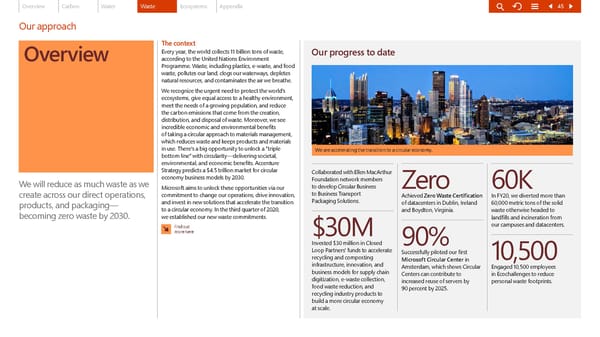Overview Carbon Water Waste Ecosystems Appendix 45 Our approach The context Every year, the world collects 11 billion tons of waste, Our progress to date Overview according to the United Nations Environment Programme. Waste, including plastics, e-waste, and food waste, pollutes our land, clogs our waterways, depletes natural resources, and contaminates the air we breathe. We recognize the urgent need to protect the world’s ecosystems, give equal access to a healthy environment, meet the needs of a growing population, and reduce the carbon emissions that come from the creation, distribution, and disposal of waste. Moreover, we see incredible economic and environmental benefits of taking a circular approach to materials management, which reduces waste and keeps products and materials in use. There’s a big opportunity to unlock a “triple We are accelerating the transition to a circular economy. bottom line“ with circularity—delivering societal, environmental, and economic benefits. Accenture Strategy predicts a $4.5 trillion market for circular Collaborated with Ellen MacArthur We will reduce as much waste as we economy business models by 2030. Foundation network members Microsoft aims to unlock these opportunities via our to develop Circular Business Zero 60K create across our direct operations, commitment to change our operations, drive innovation, to Business Transport Achieved Zero Waste Certification In FY20, we diverted more than products, and packaging— and invest in new solutions that accelerate the transition Packaging Solutions. of datacenters in Dublin, Ireland 60,000 metric tons of the solid to a circular economy. In the third quarter of 2020, and Boydton, Virginia. waste otherwise headed to becoming zero waste by 2030. we established our new waste commitments. landfills and incineration from Find out our campuses and datacenters. more here $30M Invested $30 million in Closed 90% Loop Partners’ funds to accelerate Successfully piloted our first recycling and composting Microsoft Circular Center in 10,500 infrastructure, innovation, and Amsterdam, which shows Circular Engaged 10,500 employees business models for supply chain Centers can contribute to in Ecochallenges to reduce digitization, e-waste collection, increased reuse of servers by personal waste footprints. food waste reduction, and 90 percent by 2025. recycling industry products to build a more circular economy at scale.
 Microsoft Environmental Sustainability Report 2020 Page 44 Page 46
Microsoft Environmental Sustainability Report 2020 Page 44 Page 46